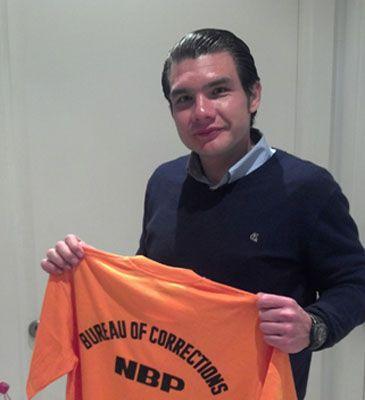Paco now works as a chef in Spain

Larañaga
Six years after being transferred from the New Bilibid Prison in Muntinlupa City to a Spanish prison, Francisco “Paco” Osmeña Larrañaga is working part-time as a chef.
“He is employed and he is earning…I’m happy and proud that he has reached his dream of being a chef,” said Paco’s mother Margarita at the sidelines of yesterday’s celebration of the 137th birth anniversary of former president Sergio Osmeña Sr.
Margarita is a grandaughter of Sergio.
Paco was 27 years old when he and six others were convicted in Cebu for the 1997 abduction, rape and murder of sisters Marijoy and Jacqueline Chiong in 2004.
The 37-year-old Larrañaga, who is half-Spanish, now works at a Spanish restaurant near his apartment in San Sebastian, Spain from Mondays to Thursdays.
His mother said Paco is allowed to leave his cell without a security escort and head to work at the restaurant. He then returns at night to his cell.
No liberty
Paco was arrested in 1997 while he was studying at the Center for Culinary Arts in Quezon City.
For the past two years, Paco studied hotel and restaurant management under a temporary license granted by the Prison Support Team in a penitentiary.
His mother Margarita said the right to work by prisoners is guaranteed under the Spanish Constitution of 1978, which states that prisoners have “the right to paid employment.”
Paco is classified as a “third-degree” prisoner, or the least dangerous in the Spanish prison system.
“I’m happy for my child, but I am still sad because he still has to sleep in jail. He has no liberty,” his mother said.
In 2009, Paco was transferred to a maximum-security prison in Soto del Real, Madrid, Spain named the Madrid Central Penitentiary.
Thelma Chiong, mother of the Chiong sisters, objected to the transfer to no avail.
The transfer was in line with a Treaty of Sentenced Persons signed between the Philippines and Spain.
A Spanish news organization named Noticias de Gipúzcoa (Journal of Gipuzcoa) reported that four years later, Larrañaga was moved to a second-grade prison in Martutene, San Sebastian, Spain.
It was in Martutene that Larrañaga was granted special licenses for his education and work.
Paco’s legal troubles were portrayed as a search for justice for a young man framed for a crime he didn’t commit in the award-winning documentary “Give up Tomorrow”.
Disclaimer: The comments uploaded on this site do not necessarily represent or reflect the views of management and owner of Cebudailynews. We reserve the right to exclude comments that we deem to be inconsistent with our editorial standards.
